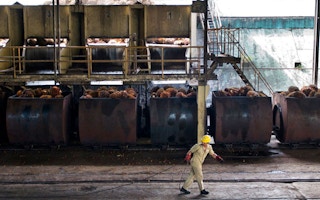Palm oil giant Golden Agri-Resources (GAR) on Thursday announced that all the palm oil it processes in Indonesia can now be traced back to the mill where it was produced, a move which the company says will help promote sustainable practices among its suppliers.
The Singapore-listed company, which has a market value of US$2.9 billion, said that for all the palm oil processed in its Indonesian facilities such as refineries and kernel crushing plants, it now knows exactly which of its 489 mills supplied the oil.
The company embarked on this supply chain mapping exercise in March 2014 in an effort to raise transparency in an industry where supply chains are often opaque and complex. The supply chain data, along with other information about the company’s sustainability initiatives, is available on its Sustainability Dashboard.
While all of GAR’s palm oil comes from Indonesia, the company’s other operations include soybean crushing plants and refineries in China.
Anita Neville, vice president for corporate communications and external affairs, GAR, told Eco-Business that “gaining visibility on our supply chain enables us to ensure that our supply chain is operating in line with our sustainability commitments”.
For example, the information from this exercise will help GAR develop better training programmes for suppliers on how to comply with its sustainability policy, which was first unveiled in 2011 and updated last year to include suppliers.
The policy lays out rules on no deforestation and no development on peatland, paying workers a fair wage, and respecting the right of communities to give free, prior, and informed consent before handing over land for new plantation projects.
With more than 480,000 hectares of plantation under management in Indonesia, GAR is the world’s second largest palm oil plantation company. Last year, the company bought 7 million tonnes of crude palm oil and palm kernel oil from its suppliers, which include both independent and GAR-owned mills.
Mapping out this expansive supply chain required intensive engagement with suppliers, noted Neville. GAR , in partnership with United-Kingdom based non-profit environmental consultancy TFT (formerly known as The Forest Trust), worked with each supplier to log the traceability information required.
Types of data gathered included the location of their mills, names of their parent companies, and whether they were endorsed by the Roundtable on Sustainable Palm Oil (RSPO). RSPO, based in Kuala Lumpur, Malaysia, is the industry association for certifying that palm oil is grown in an environmentally and socially responsible way.
GAR and TFT also conducted field visits to some of these suppliers to better understand the support they need to operate more sustainably. The company will use this information to develop a support programme for all its suppliers, said Neville.
“
We see a clear industry trend where buyers want more information on the impact of the palm oil they purchase.
Paul Hickman, head of global vegetable oils and oilseeds, trading, Golden Agri-Resources
Suppliers also welcomed this move by the company. Berlino Mahendra Santosa, planning and development director, PT Perkebunan Nusantara 5 - a GAR supplier - noted that “we are able to benefit from their expertise and experience as well as share our own experiences and challenges”.
“By investing in supplier outreach and training, GAR has shown that it is serious about helping all of us improve our sustainability practices,” he added.
The completion of this supply chain mapping exercise follows a tumultuous year for GAR, during which it was implicated in a controversial complaint filed by United Kingdom-based campaigning group Forest Peoples’ Programme (FPP).
Last March, FPP claimed that for one of its concessions in Kalimantan, Indonesia, a GAR subsidiary, PT Kartika Prima Cipta, had not done necessary land assessments before carrying out new plantings on its concessions and it also did not have the required permits for developing plantations.
RSPO in May upheld the complaint, and ordered GAR to stop new plantings in that concession until the violations had been addressed. In June, TFT also suspended some of its work with GAR due to concerns about social and environmental violations, but the two organisations resumed their collaboration in November.
Last year was also marked by record-breaking forest fires in Indonesia, where burning vegetation and peatland caused a toxic haze over much of Southeast Asia.
Green groups blamed the forestry sector, especially the pulp and paper and palm oil industries, for the destruction, as burning land to make way for plantations is a common practice, especially among smallholder farmers.
The crisis sparked renewed calls for palm oil companies to make their supply chains more transparent, so that manufacturers and consumers could check whether the palm oil in their products was grown on illegally burned land.
Paul Hickman, head of global vegetable oils and oilseeds, trading, GAR, noted in a statement that “we see a clear industry trend where buyers want more information on the impact of the palm oil they purchase”.
“Our customers can rely on GAR to continue improving the information available about our supply chain,” he added.
The company plans to go further to make its supply chain traceable back to the plantation, and will announce details of a time-bound plan to do so by the end of this quarter.
Neville noted that “in meeting the demand for transparent supply chain information, we do see a competitive advantage”.
Traceability also helps “build a more effective, resilient and productive supply chain which will contribute to the longevity of GAR as a business,” she added.

















